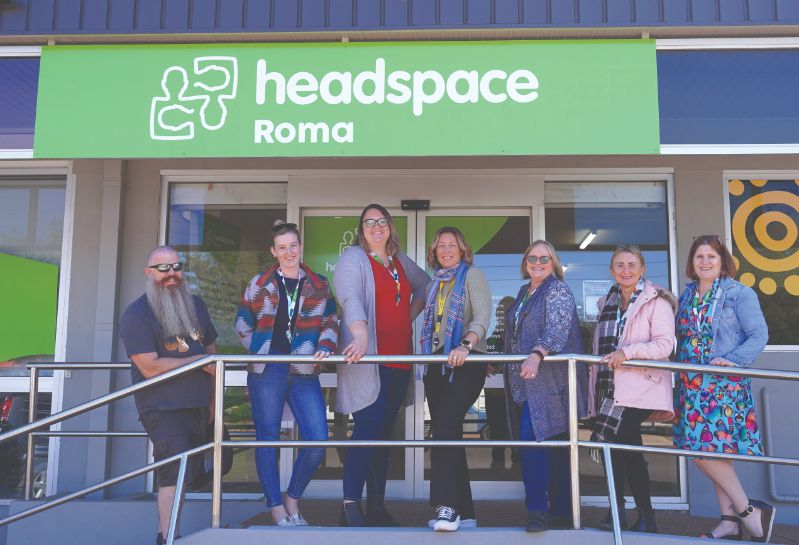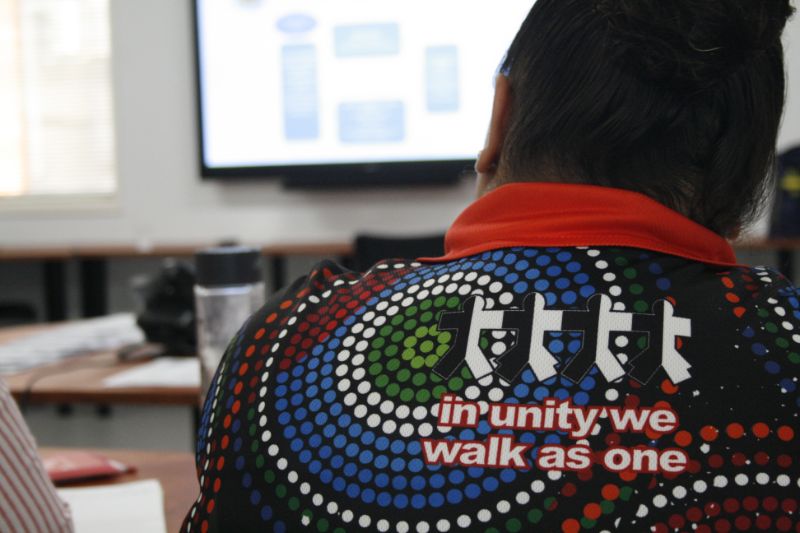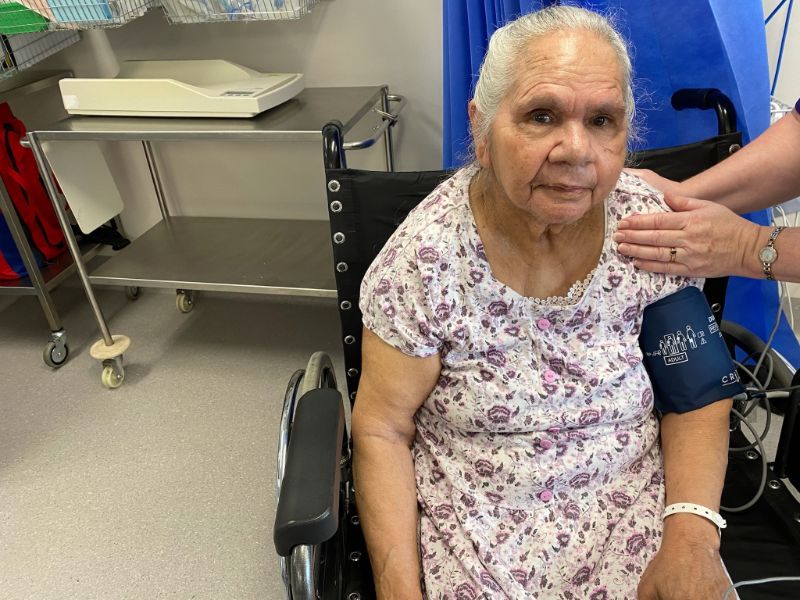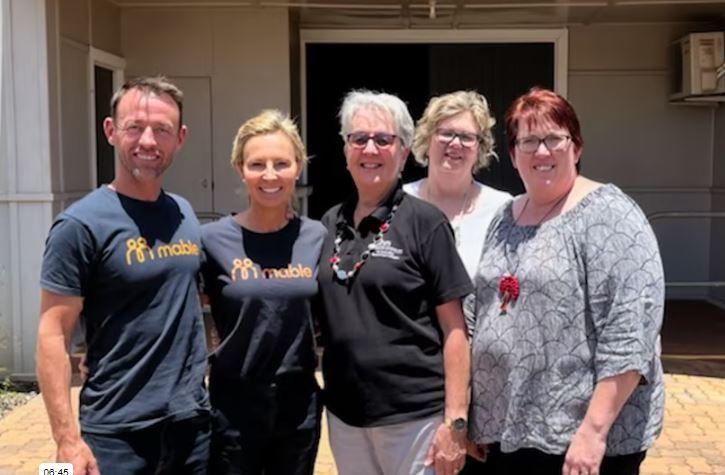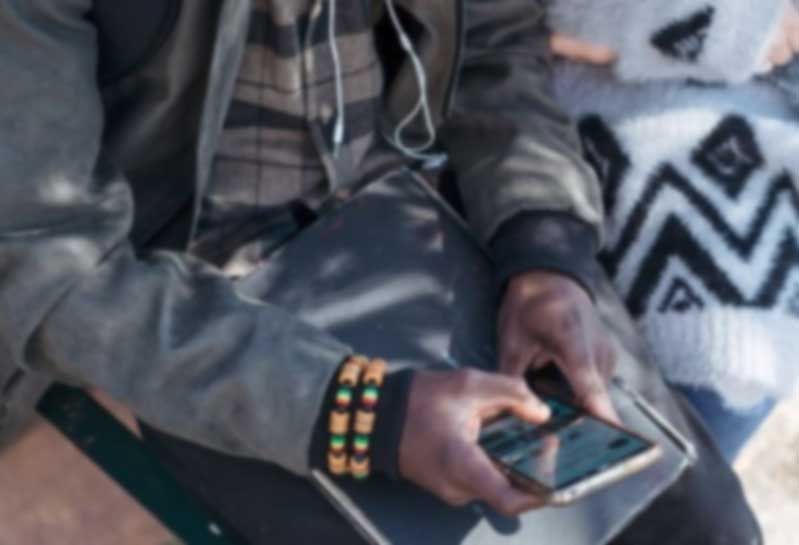Strategy 3: Closing the Gap
Welcome to the WQPHN 2021-2022 Annual Report Highlights. For a printable version of the report, please click here.
WQPHN and Nukal Murra Alliance (NMA) members are working towards lifting the capacity of the primary health care system to increase access to First Nations Health Assessments across the Western Queensland region.
Nukal Murra Health Support Services aim to improve outcomes for Aboriginal and Torres Strait Islander people accessing culturally appropriate mainstream services and care. The goal of the Alliance is to work collaboratively with other funded agencies to support the re-direction of funds to Indigenous Health programs.
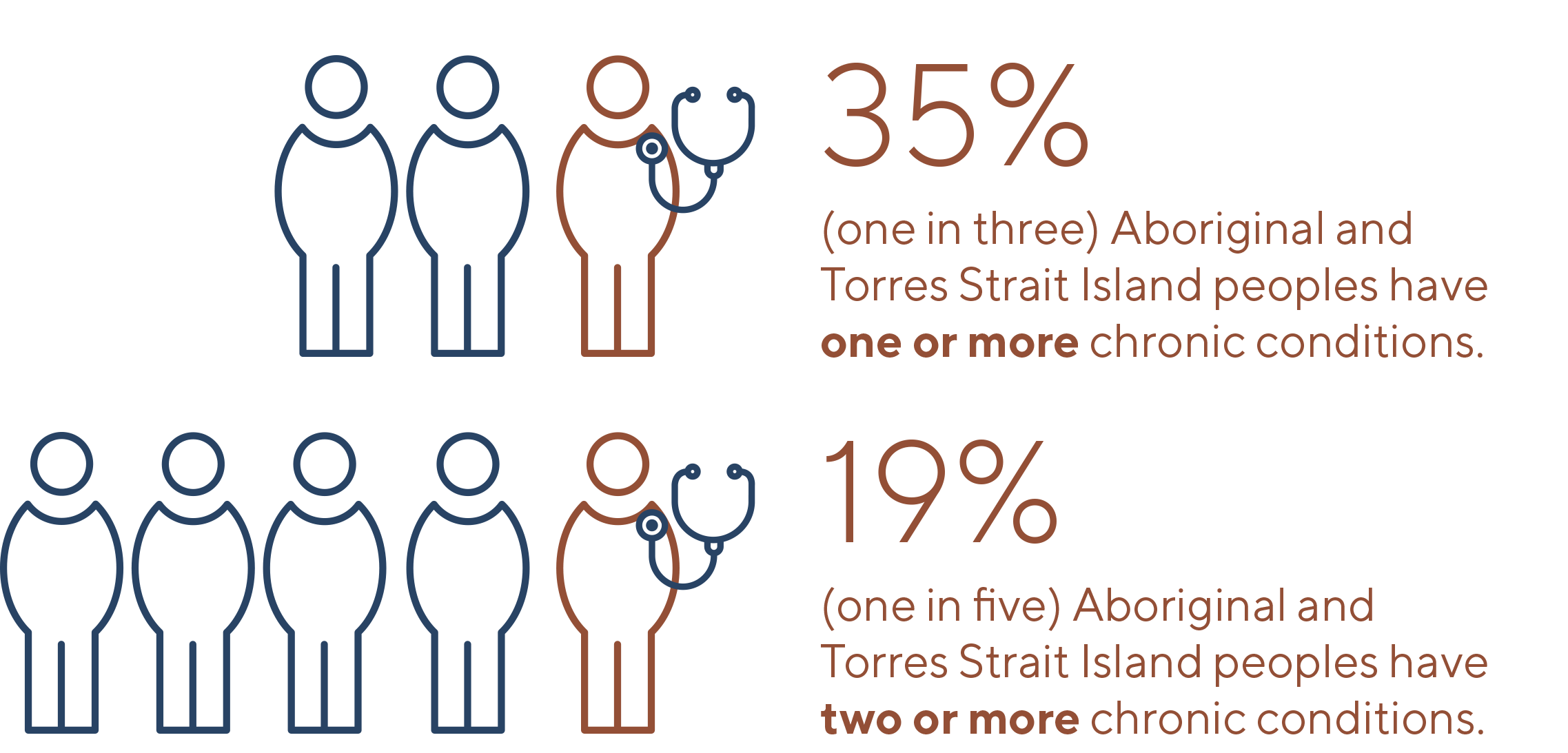

Nukal Murra Alliance provided:

Social and Emotional Wellbeing (SEWB)
WQPHN recruited a full-time Social and Emotional Wellbeing (SEWB) Regional Coordinator to undertake and build capacity of services within the Nukal Murra Alliance (NMA) member organisations. The core functions include enhancing existing commissioned mental health services, and the promotional supports associated with mental health responses for our First Nations people.
The SEWB Mental Health Training and Development Program was provided to two member services by an Outreach Private Consultant Service “Wakai Waian Healing” and Founder- Mr Edward Mosby (Senior Psychologist). The Service provides support with the direct delivery of individual and group therapeutic services, supporting local SEWB Workers and their co-workers with professional development opportunities through mentoring/supervision, and providing direct support and guidance to enhance community and service collaboration and capacity building efforts.
Mornington Island Health Council
Mel Riordan, Rural Health Consulting
When the Mornington Island Health Council developed the inaugural Mornington Island Health Strategy 2019-2024, in partnership with Gidgee Healing, Western Queensland Primary Health Network (WQPHN), North West Remote Health and the North West Hospital and Health Service, the primary goal was to ensure a planned and collaborative approach to improve the health and wellbeing of our community. Since its development, the Strategy has provided a roadmap for government agencies, service providers and other stakeholders to understand the key priority areas for the Mornington Island community.
A soon as it was developed, we realised that we needed to be able to monitor how we were going in achieving the objectives contained within the Strategy. We also wanted to be able to draw on an evidence base and really understand whether the health of our community was improving, staying or same, or perhaps even worsening? It was also paramount that the information was able to be translated in a way that means something to the community. While obtaining reliable health data can be difficult for a community of our size and level of remoteness, WQPHN has worked closely with the Mornington Island Health Council and other partners to identify a data set to enable us to achieve our goals. We have phased our approach, starting with population data, practice data and hospital data that was more readily available. We are in the process of building upon this data set and expanding the information we have available to include other important priority areas, such as early childhood development, mental health and social and emotional wellbeing indicators. Over time, the Data Dashboard will also enhance the capacity of the health service system to identify gaps in service delivery, or similarly, to identify specific areas that may need additional focus.
First Nations Workforce
The WQPHN, alongside our MOU partners, RFDS Qld, CheckUp and Health Workforce Queensland have joined forces with the Nukal Murra Alliance Member organisations to progress a Western Queensland Rural and Remote Aboriginal and Torres Strait Islander workforce strategy for the region.
The Nukal Murra Alliance Members represent the four Aboriginal and Torres Strait Islander Community Controlled Health Services across the West and are the primary employers of the First Nations people across the footprint.
The MOU partners have engaged Petraichor Partners to assist with development of both the strategy and implementation plan to ensure that we put our ideas into firm actions, resulting in growing our own local Aboriginal and Torres Strait Islander health workforce via consultation with key stakeholders.
All partners agreed a sustainable health workforce in rural and remote Queensland hinges on how well they engage with the local community and develop the capacity of local people to undertake roles in health. This not only provides a level of cultural sensitivity for the consumer and the service that’s being delivered, but it also provides opportunities for building careers in health.
“They provide the vital linkages to communities and can ensure that what we build is achievable and realistic, and is geographically, culturally and financially appropriate for the region.”
Diabetes and Prevention Programs
WQPHN commissioned Gidgee Healing to employ a full-time Diabetes Aboriginal Health Worker in November 2021 to coordinate culturally appropriate diabetes education, with an aim to promote and support diabetes management and selfcare, to enhance quality of life and reduce the risks of diabetes-related complications amongst Aboriginal and Torres Strait Islander communities. Many stakeholders have been involved in supporting this exciting new role, including Diabetes Queensland and the First Nations Health Unit. The Western Queensland (WQ) Visiting Credentialed Diabetes Educators (VCDEP) are also collaborating to plan and triage care for people with diabetes in the area, by developing tailored culturally appropriate group education workshops to further support this diabetes care. WQ VCDEP continues to provide diabetes health care professional education to general practices within the WQ region. The program is expanding, and group education has been facilitated in Mount Isa, Charleville and Roma. In late 2021, WQPHN signed on to a three-year contract with My Health For Life, and we introduced the Patient Activation Measure (PAM) in general practices. The Move It North Queensland (NQ) program has expanded to more towns, with virtual delivery methods and capacity building initiatives also being developed for hard to reach individuals and communities.
The Western Queensland (WQ) Visiting Credentialed Diabetes Educators Program (VCDEP) collaboratives to plan and triage care for people with diabetes in the area, to optimise health outcomes to support self- management and care to enhance quality of life and reduce the risks of diabetes-related complications. WQ VCDEP continues to provide diabetes healthcare professional education to general practices within the WQ region as well as developing tailored culturally appropriate group education workshops to further support diabetes care within the community. The program is expanding, with group education being facilitated in Mount Isa, Charleville and Roma. WQPHN commissioned Gidgee Healing to employ a full-time Diabetes Aboriginal Health Worker in November 2021. The program coordinates culturally appropriate diabetes self-management amongst Aboriginal and Torres Strait Islander communities. Many stakeholders have been involved in supporting this exciting new role, including Diabetes Queensland and the First Nations Health Unit.
To further promote prevention activities and programs in WQ, in late 2021, WQPHN signed on to a three-year contract with My Health For Life, and we introduced the Patient Activation Measure (PAM) in general practices. The Move It North Queensland (NQ) program has expanded to more towns, with virtual delivery methods and capacity building initiatives also being developed for hard to reach individuals and communities.
.
Our Stories
Nukal Murra Virtual Home Monitoring
Chronic diseases are long-lasting, and while most are preventable and treatable, they cause approximately 64% of the disease burden among Aboriginal and Torres Strait Islander peoples and approximately 80% of the mortality gap. Virtual Remote Monitoring (VRM) is a digital tool for better management of chronic conditions. Goondir Aboriginal and Torres Strait Islanders Corporations for Health Services (Goondir Health Services) have launched a VRM program.
WQPHN are committed to funding an expansion of the program within the Nukal Murra Alliance, which brings together the WQPHN and the Aboriginal and Torres Strait Islander Community Controlled Health Services (AICCHO) in a regionally focused, culturally informed partnership to improve the health, social and emotional wellbeing of our communities. Goondir Health Services patients are provided with a Bluetooth enabled monitoring device kit. Daily observations from the devices are recorded and transmitted into a portal which is accessed by an assigned clinician. The kit includes a blood pressure monitor, blood glucose monitor, pulse oximeter, weight scale and tablet.
In the program's first year there was 86% of all respondents rated the usability of the equipment as excellent and 58% of clients completed all their vital sign monitoring tasks. There were clinically significant reductions in measured outcomes and evidence of reduced hospitalisations.
Ed Mosby reflects on SEWB Services in North West Qld
“For Wakai Waian Healing (WWH), having the opportunity to partner with WQPHN and Gidgee Healing to deliver Social and Emotional Wellbeing (SEWB) services across Mount Isa and Mornington Island has been a true privilege. Working alongside their frontline SEWB staff and meeting with the organisations management has provided a valuable perspective on the challenges and opportunities that exist in this region when supporting the healing journeys of Aboriginal and Torres Strait Islander peoples.
There is without doubt an ongoing need for SEWB services across the spectrum of need from mild to severe and complex. Our initial observations suggest that one of the most significant challenges relates to establishing a well, competent, qualified, and sustainable workforce. However, facing this challenge head on is possible as there are many strengths that come form building a connection between a workforce and the community from which they more often than not come from. Investment into this workforce through ongoing professional supervision, mentoring, professional development and selfcare initiatives gives rise to opportunities to build the connection between services providers and communities.
It is in this connection that opportunities for healing exist by promoting such principles of empowerment and autonomy and finding a space for both cultural and clinical safety. Promoting a workforce focus within the partnership between WWH and Gidgee Healing is already producing a change in consumer engagement and the capacity of Gidgee Healing SEWB staff”.
Videos:
Our Stories...
headspace Roma celebrated their first birthday on Wednesday May 4, 2022, with local crew and staff enjoying the celebrations, which included a great BBQ, cake, art workshops, games and a chill out zone.
Chronic diseases are long-lasting, and while most are preventable and treatable, they cause approximately 64% of the disease burden among Aboriginal and Torres Strait Islander Peoples and approximately 80% of the mortality gap.
The steady achievers in 2021/22 have once again been the committed staff working in residential and community aged care.
Nearly 23 per cent of homes in Western Queensland have no access to the internet - we need to invest in the digital infrastructure to support access to telehealth, online supports, and community, aged care and disability services.
WQPHN collaborated with Mable to visit regional communities throughout Western Queensland to discuss options for community-led aged care services and provide workforce solutions for rural and remote areas.
WQPHN has commissioned headspace National to provide the Wellbeing in Schools Early Intervention Telepsychiatry program (WiSE).
Credits
The WQPHN website was developed and is maintained by Michael R.G. Hughes of Extremely Geeky.
Disclaimer
While the Australian Government Department of Health has contributed to the funding of this website, the information on this website does not necessarily reflect the views of the Australian Government and is not advice that is provided, or information that is endorsed, by the Australian Government. The Australian Government is not responsible in negligence or otherwise for any injury, loss or damage however arising from the use of or the reliance on the information provided on this website.
